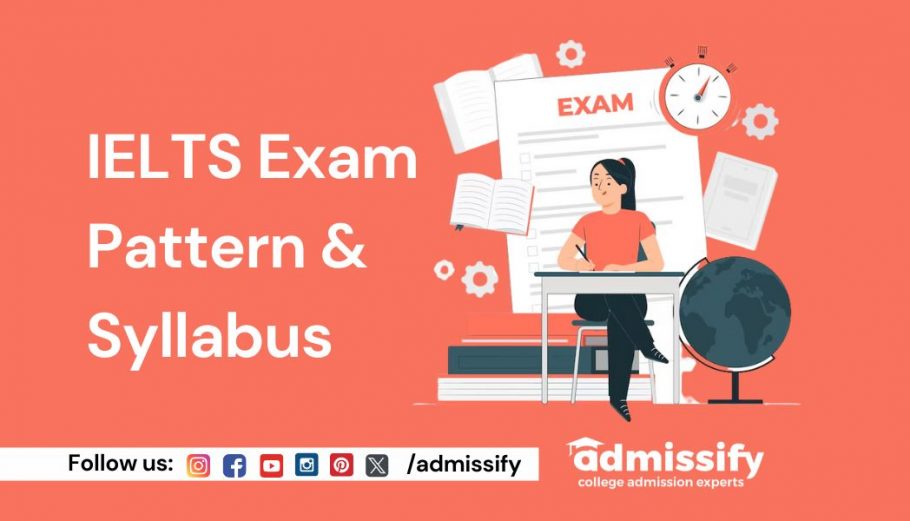Last Updated on December 13, 2024
The IELTS (International English Language Testing System) exam format is a crucial part of preparation for the test. With two versions – Academic and General Training, across four sections, it is important to understand the complete IELTS test pattern.
This comprehensive guide covers key details on:
- IELTS Exam Sections and Duration
- Question Types for Each Section
- Academic vs General Training Differences
- The Speaking Test Format
Armed with this information, you can strategize your preparation accordingly and familiarize yourself with the pattern.
Overview of IELTS Test Sections
IELTS is a 3 hour long English proficiency test with four sections:
- Listening – 30 minutes
- Reading – 1 hour
- Writing – 1 hour
- Speaking – 15 minutes
The first three are tested in one sitting while speaking is usually on another day before/after the test.
IELTS Listening Format
This first section tests your ability to understand spoken English with the following format:
- 4 recordings of native English speakers
- Recording 1 – Conversation between 2 people
- Recording 2 – Monologue
- Recording 3 – Conversation upto 4 people
- Recording 4 – Monologue on academic topic
- 40 questions across MCQs, sentence completions, matching info, fill in the blanks etc.
IELTS Reading Format
This 60 minute long section aims to test reading comprehension across 3 long texts taken from journals, books, newspapers etc. on a range of topics.
The reading test format is as follows:
- 3 reading passages with a variety of topics
- Passages are logical, factual, analytical, descriptive
- 40 questions testing detail analysis, logical argument, key info etc.
- Question types include MCQs, short answers, sentence completion etc.
IELTS Writing Section Format
Two writing tasks are given to be completed in 60 minutes to test writing ability:
Task 1 (20 minutes)–
- Academic test – Interpret graph/table/chart/process
- General Training – Write letter of 150+ words
Task 2 (40 minutes):
- Both Academic & General Tests: Write 250 word+ essay
Topics are suitable for undergraduate & postgraduate admissions.
IELTS Speaking Test Format
This 15-minute section assesses spoken English skills with a face-to-face oral interview. Sections include:
Part 1 – General intro questions (4-5 minutes)
Part 2 – Talk on given topic after 1 minute prep (3 minutes)
Part 3 – Questions related to part 2 topic (4-5 minutes)
Scoring and Results
You get a band score from 1-9 on each section, averaged into an overall band. Results are declared in 5 days (computer IELTS) or 13 days (paper IELTS).
Important Links:
Key Differences: Academic vs General Training
While the test format stays similar, the two test versions differ in their content and difficulty levels across the Reading and Writing sections. The Academic test has complex vocabulary and texts, while General test focuses more on basic survival skills in broader contexts.
So choose the right test for your purpose – work or education overseas.
Takeaway Tips
Get familiar with all aspects of the IELTS test format 2024 including:
- Sections, duration and scoring
- Types of tasks, texts, questions
- Academic vs General Training Differences
- Speaking test components
Knowing the exam pattern thoroughly will help your test preparation and strategy for high band scores. So learn the format and structure in detail as the first IELTS preparation step.
| Sections with Duration | IELTS Academic Test Description | Total Questions |
| Listening(30 minutes) | It includes four recorded dialogues and monologues. | 40 |
| Reading(60 minutes) | Three lengthy reading sections with exercises. Texts might be factual, discursive, descriptive, analytical, or include non-verbal elements like graphs, pictures, and diagrams. texts are real and sourced from newspapers, books, and journals. | 40 |
| Writing(60 minutes) | A candidate must write at least 150 words in Writing Task 1 in which they must explain, summarise, or graph a table, chart, or figure. A candidate must compose a brief essay of at least 250 words for Writing Task 2. | 2 |
| Speaking(11-14 minutes) | A face-to-face interview consists of the candidate’s introduction, a cue card, and an in-depth conversation. | 3 |
Check Other Test Preparation:
FAQs
How many sections are there in the IELTS exam?
There are four sections in the IELTS exam – Listening, Reading, Writing, and Speaking.
What is the total duration of the IELTS test?
The total duration of the IELTS exam is around 3 hours. Listening, Reading, and Writing sections are completed in one stretch over 2 hours and 45 minutes. The Speaking test may be taken up to 7 days before or after the other three tests.
What are the different types of IELTS exams?
There are two types of IELTS exams – IELTS Academic and IELTS General Training. While the Speaking and Listening sections are the same for both, the Reading and Writing sections differ.
What question types are asked in the IELTS Reading section?
Question types in Reading can include multiple choice questions, short answer questions, sentence completion, matching headings to paragraphs, classification of paragraphs into categories, and matching words/phrases.
How does the IELTS Writing test differ for Academic and General Training?
In Writing Task 1 for Academic, candidates have to analyze a graph/table/chart while for General Training, they have to write a letter. Task 2 is an essay task, common to both versions.
How long do I get to prepare for Speaking Part 2?
In Speaking Part 2, after getting the cue card topic, you have 1 minute to prepare before talking continuously about the given topic for 2 minutes.
Do I have to take notes or record audio for any section?
No, there is no requirement as such to take down notes or record audio. The listening clips will play only once in each section, so focus on listening.
How long do I get to see my results and scores?
For computer-delivered IELTS you get your score within 5 days while for paper-based you get it in around 13 days from the date of your actual test.

Manan is a graduate of the esteemed University of Delhi where he cultivated a taste for writing and research. His degree in Bachelor of Management Studies helps him guide students in their academic endeavours. Manan strives to spread excellent study abroad tips that can prove to be helpful.




